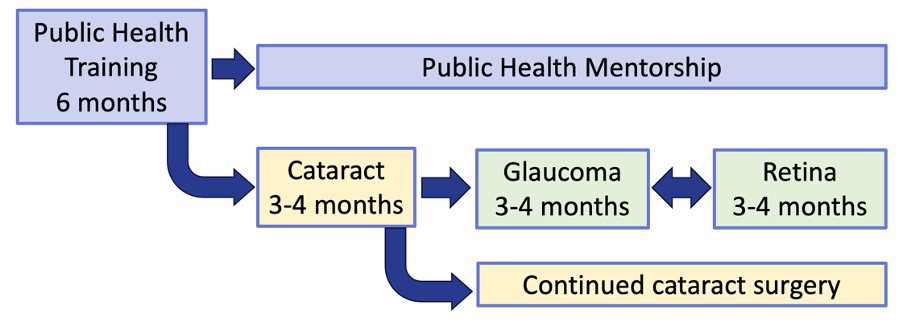Africa Public Health & Comprehensive Ophthalmology Fellowships
***Deadline to apply 10th April 2026***
Introduction
The Public Health & Comprehensive Ophthalmology Fellowships are a collaboration between the International Centre for Eye Health and three ophthalmology clinical institutions in Kenya (City Eye Hospital, Lions SightFirst Eye Hospital and Kisii Eye Hospital), with the aim of equipping ophthalmologists with the knowledge and skills to improve the eye health of populations they serve.
In 2026, these fellowships are targeting ophthalmologists from the COECSA region who have relatively recently completed their residency training.
Objectives
Fellows will:
-
- Develop an understanding of the role of public health for eye care in strengthening health systems in their country and catchment areas
- Be equipped to use a structured approach to applying public health principles in developing clinical services at a population and facility level
- Build core research skills for evidence-based eye health, both understanding and developing research
- Acquire additional practical clinical skills to enable individuals to deliver more effective comprehensive clinical ophthalmology services, specifically in the areas of cataract, glaucoma and diabetic retinopathy
- Facilitate personal development and career progression through self-reflection and critical appraisal
Structure
The 18-month fellowship programme has two distinct components:
Part A – public health training: e-portfolio in Public Health for Eye Care (PHEC). The post-graduate (PG) PHEC e-portfolio must be completed prior to the commencement of the comprehensive clinical training phase. During these initial six months the Fellows are based at their home institution. An agreement must be reached, before starting the fellowship, with the home institution to release the candidate one day per week to work on self-directed online learning and completion of 6 public health for eye care modules supported by online interactive sessions with ICEH faculty.
Part B – Clinical Training for 12 months. Training will concentrate on key elements of ‘comprehensive ophthalmology’. The three priority areas included are cataract, glaucoma and diabetic retinopathy. See the figure below for an outline of the clinical training structure.
During Part B, the fellowship programme will build on the public health online training in Part A by providing opportunities to learn from eye care programmes run by the training institutions. Fellows will receive continued online mentorship from ICEH during part B during which they will develop a project or research proposal focus on eye care services strengthening to be implemented on their return to their home institutions.

Selection Criteria
Before you apply please carefully check whether you meet all the following essential and any of the desirable selection criteria:
Essential (you must meet all of these):
- Qualified medical doctor AND qualified ophthalmologist (complete residency/Mmed training), holding a licence to practise and currently working as an ophthalmologist in a COECSA country
- Ophthalmologist within 5 years after completing their residency / MMed training (excluding career breaks for maternity leave)
- Currently employed by an institution in a COECSA country in which there is a demonstrable need for enhanced eye care services
- The requested training fellowship has strong relevance to the needs of population served by their home institution and the capacity needs of their local team
- Letter from the candidate, providing a clear written commitment to returning to their current institution at the end of the fellowship period
- Declaration from the applicant that they have access to a computer/mobile device and internet and appropriate skills to undertake online learning
- Institutional support: a letter of support and practical commitment signed by both (1) the head of department and (2) the hospital executive director (or equivalent).
Desirable:
- Work substantially (80%+) in a government hospital, university hospital or NGO or social enterprise ophthalmology unit
- Have a role in training others
- Have a clearly articulated interest in public health in eye care and how they would apply training in this area
How to apply
Download application form here
Please complete the form clearly. All information relevant to your application must be included on this form.
- Additional documents to be included in your application:
- Your CV
- Primary medical qualification certificate
- MMed / Residency completion certificate
- Letter from you, the candidate, providing a clear written commitment to returning to their home institution at the end of the fellowship period
- Letter of support signed by both the head of your department and the head of the institution. The letter will need to state:
strong support for the candidate receiving this training- how this combined public health and clinical training fellowship is relevant and desirable for their context
- that they will release the fellow from clinical duties for a minimum of 1 day per week during the first six months, in order study for the post-graduate e-portfolio in public health for eye care
- what the institution will commit to ensure that the fellow will be properly resourced (with a position, facilities and equipment) to develop ophthalmology their services on completion of the fellowship
- confirm that there are no “safeguarding” concerns in relation to the candidate
DEADLINE FOR APPLICATIONS: 10th April 2026
If you have any questions please contact marcia.zondervan@lshtm.ac.uk
